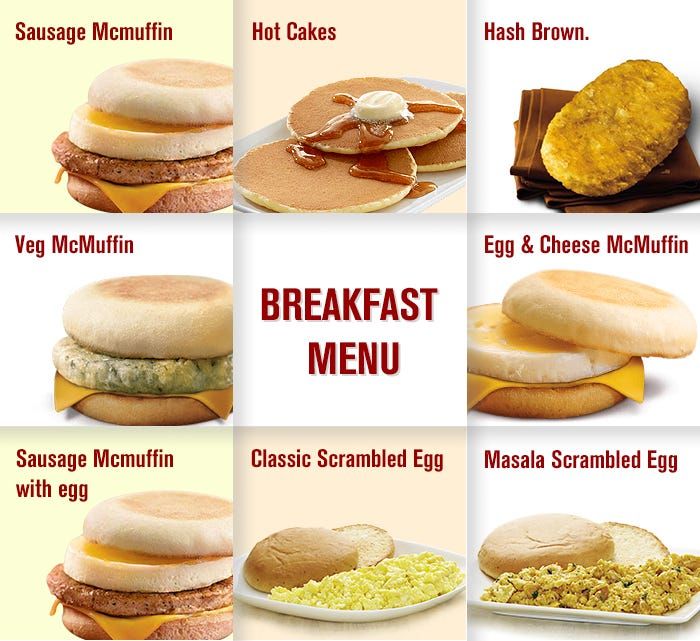McDonald's origins may have revolved around burgers and fries, but today, their breakfast offerings are equally renowned. Dominated by breakfast sandwiches and hotcake combos, their menu also features other familiar items. However, in terms of nutrition, not all choices are created equal. While some offer a balanced meal and can be supplemented with sides for a heartier option, others are packed with calories, fat, and sugar. Here's how to navigate the best and worst breakfast choices on McDonald's menu.
It's advisable to limit intake of nutrients like sodium, sugar, and saturated fat to prevent chronic diseases. Consequently, menu items with the highest levels of these nutrients rank poorly on our list. Conversely, options rich in fiber and protein rank higher. Caloric content also influences ranking; items providing a reasonable calorie count rank better than those exceeding typical energy requirements for a meal.
Considering these criteria, here's the comprehensive ranking of McDonald's breakfast menu based on nutrition.
16) The Unhealthiest McDonald's Breakfast Is… the Big Breakfast with Hotcakes
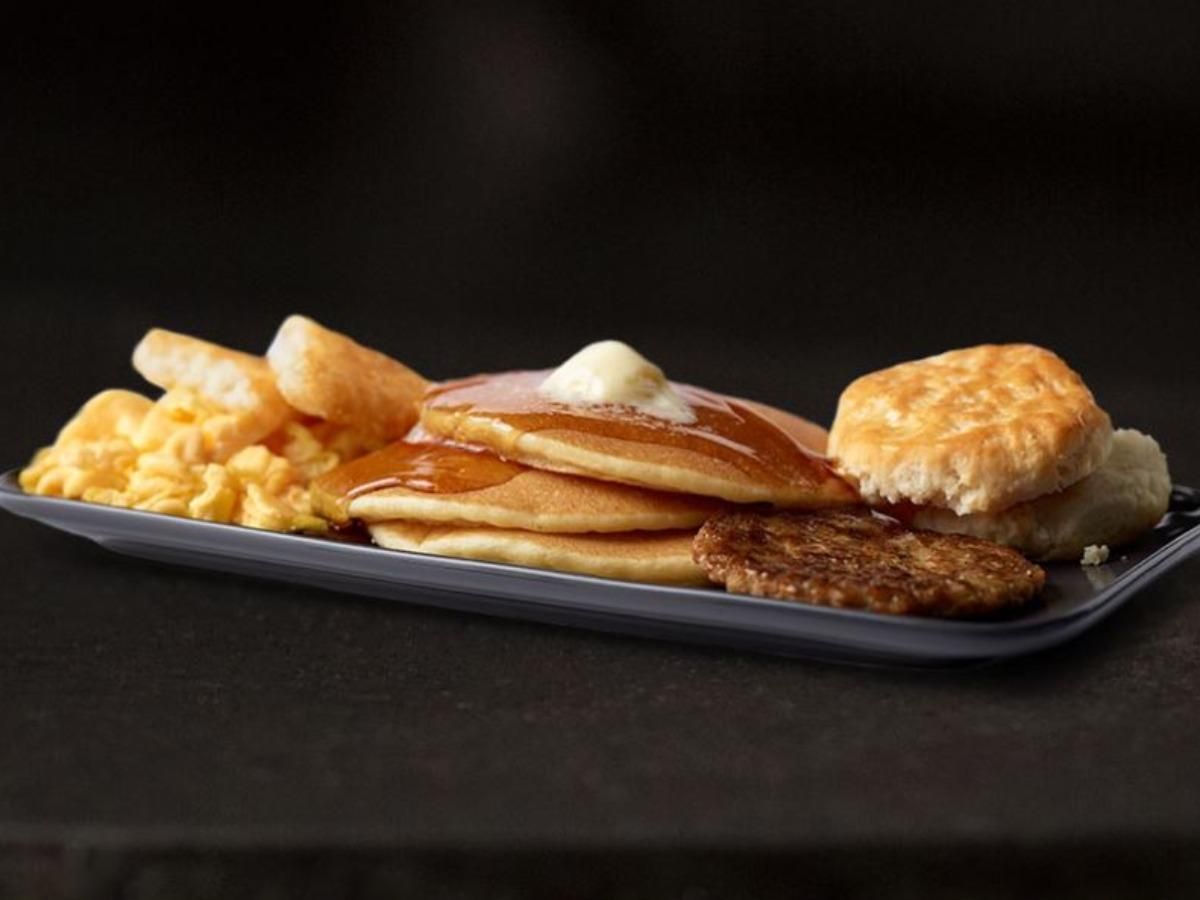
NUTRITIONAL INFORMATION (PER SERVING):
CALORIES: 1340
FAT: 63 g (Saturated Fat: 24 g)
SODIUM: 2070 mg
CARBOHYDRATES: 158 g (Dietary Fiber: 5 g, Sugars: 48 g)
PROTEIN: 36 g
Consuming over 1,000 calories in a single meal regularly while maintaining a healthy weight is a challenge for most individuals. This meal exceeds 1,300 calories, which might suffice for an entire day's intake for some. Furthermore, it contains 41 grams of added sugar, nearly reaching the recommended daily limit. Unless splitting this meal among multiple individuals, it's advisable to opt for a more nutrient-dense option to conserve calories.
15) Big Breakfast
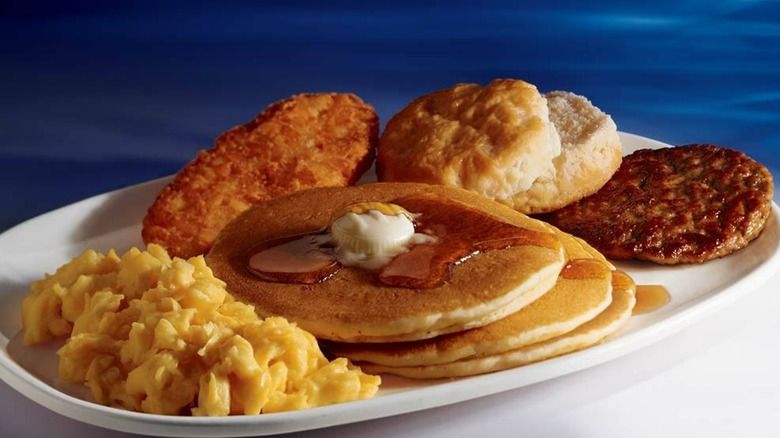
NUTRITIONAL PROFILE (PER SERVING):
CALORIES: 760
FAT: 48 g (Saturated Fat: 18 g)
SODIUM: 1530 mg
CARBOHYDRATES: 57 g (Dietary Fiber: 3 g, Sugars: 3 g)
PROTEIN: 26 g
Although this meal contains significantly less sugar compared to the Big Breakfast with Hotcakes, its overall nutritional value falls short. Providing over 700 calories, it offers a mere 3 grams of fiber. For context, adults should ideally aim for about 7 grams of fiber per 500 calories consumed, with many falling short of this essential nutrient. Additionally, this meal supplies more fat than necessary for some individuals' daily intake, let alone a single meal. Omitting the sausage reduces fat content by approximately 18 grams while still retaining 20 grams of protein. While this customization enhances the meal's healthfulness slightly, superior options remain available on the menu.
14) Hotcakes and Sausage
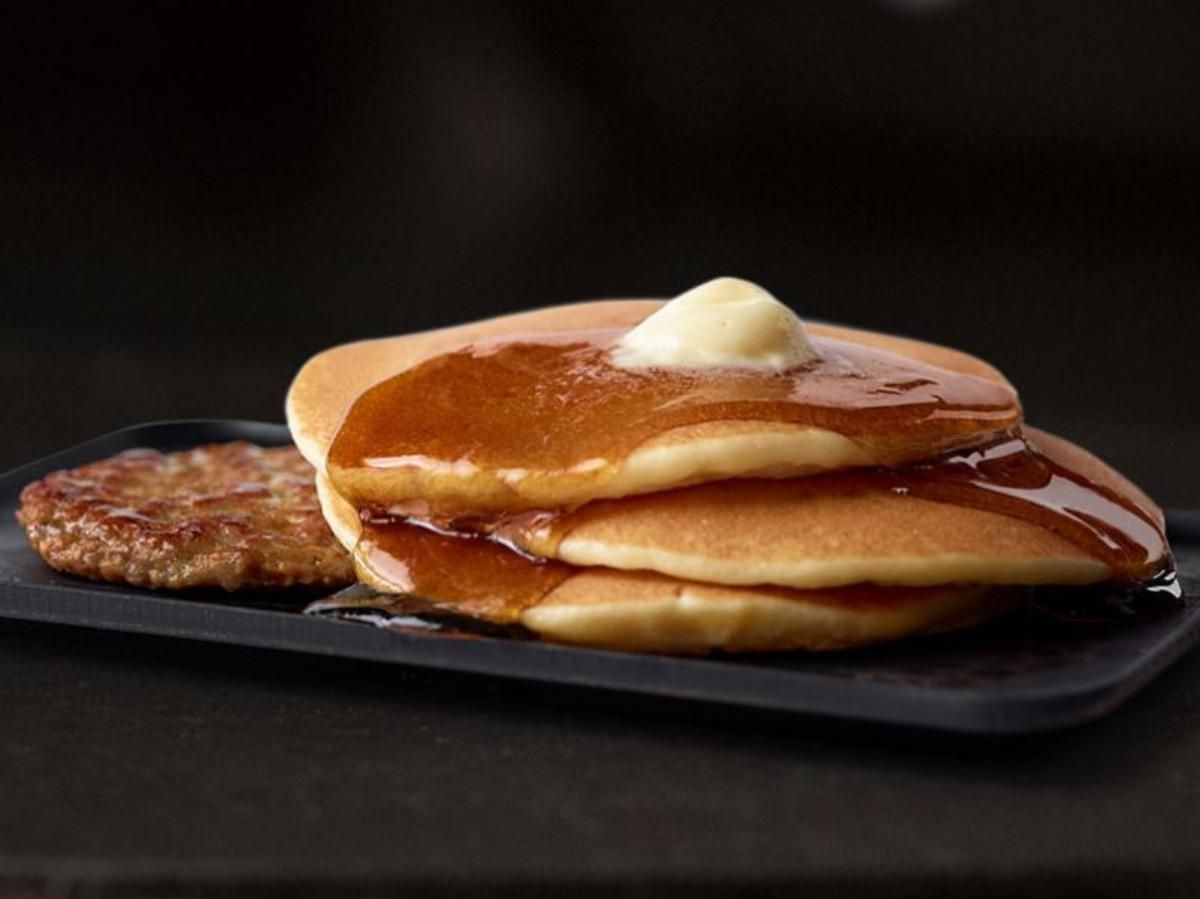
NUTRITIONAL INFORMATION (PER SERVING):
CALORIES: 770
FAT: 33 g (Saturated Fat: 12 g)
SODIUM: 810 mg
CARBOHYDRATES: 102 g (Dietary Fiber: 2 g, Sugars: 46 g)
PROTEIN: 15 g
Hotcake meals are consistently low-ranking on our list primarily due to their high sugar content. With nearly a day's worth of added sugar packed into a single dish, it's advisable to consider skipping the pancakes altogether. Alternatively, eliminating the syrup can significantly reduce the added sugar intake, rendering it a more sensible choice. However, even with the syrup omitted, the meal retains a high fat and saturated fat content.
13) Hotcakes
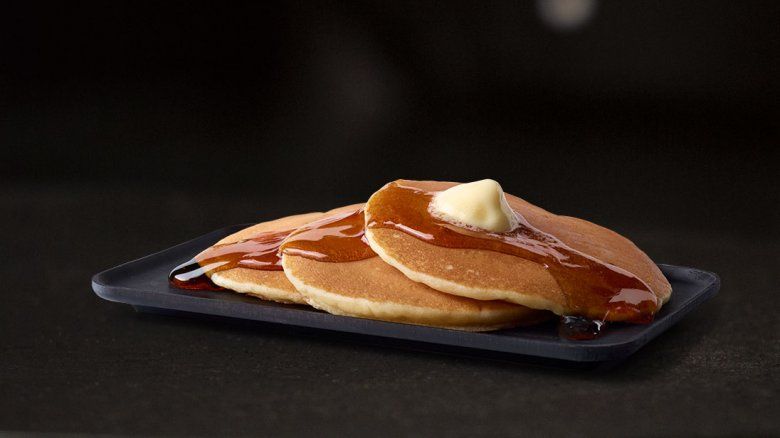
NUTRITIONAL PROFILE (PER SERVING):
CALORIES: 580
FAT: 15 g (Saturated Fat: 6 g)
SODIUM: 530 mg
CARBOHYDRATES: 101 g (Dietary Fiber: 2 g, Sugars: 45 g)
PROTEIN: 9 g
Opting for plain hotcakes results in a lower-calorie meal, albeit with a sacrifice in protein content. With only 9 grams of protein, this meal falls short of providing a balanced option. Protein is a vital nutrient, and many adults should aim for around 20 grams per meal to meet their daily minimum requirements. Even without the syrup, this meal lacks sufficient protein to be considered well-rounded.
12) Sausage, Egg & Cheese McGriddle
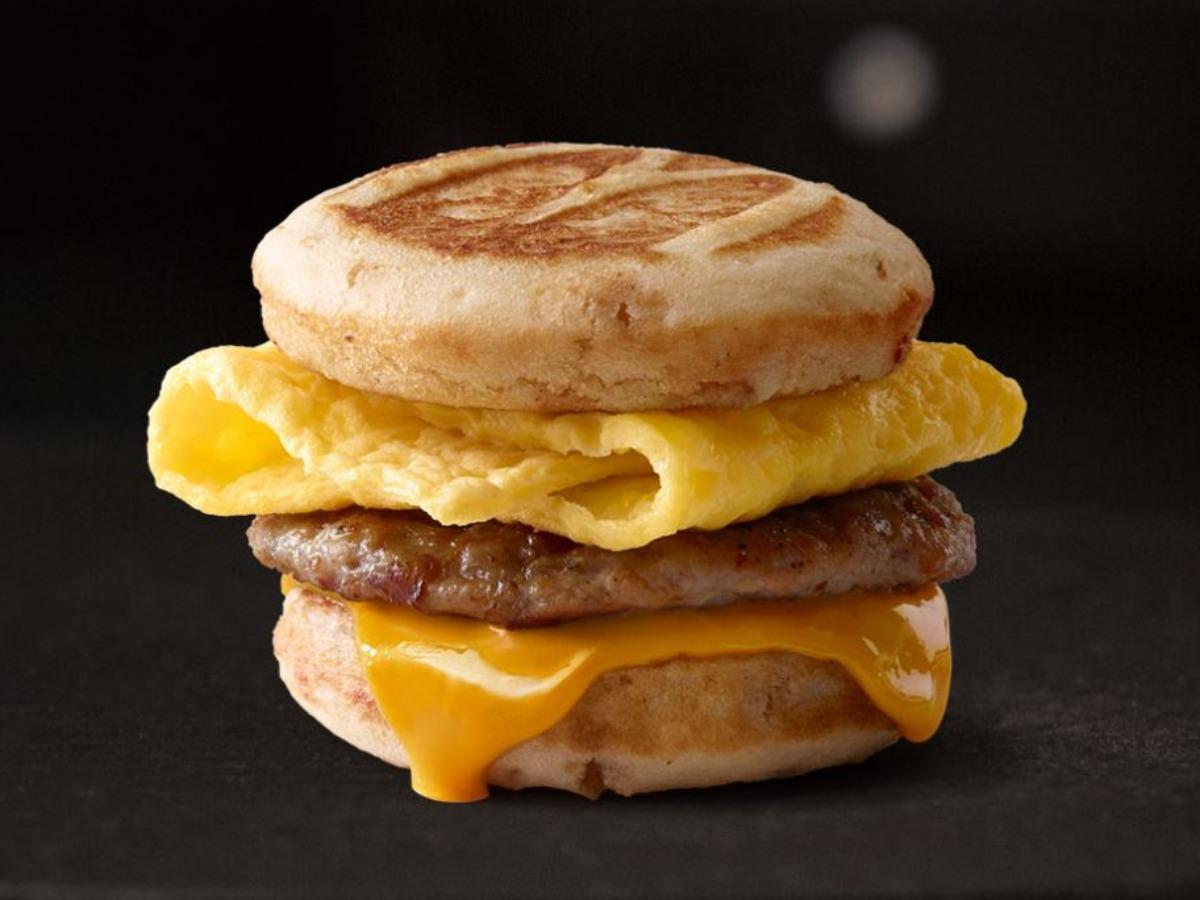
NUTRITIONAL INFORMATION (PER SERVING):
CALORIES: 550
FAT: 33 g (Saturated Fat: 13 g)
SODIUM: 1290 mg
CARBOHYDRATES: 33 g (Dietary Fiber: 2 g, Sugars: 15 g)
PROTEIN: 19 g
While a breakfast sandwich filled with savory ingredients and griddle cakes infused with maple syrup might seem like a delightful treat, the nutritional reality falls short. Offering only 2 grams of fiber, this option lacks quality carbohydrates. Moreover, the 13 grams of saturated fat surpasses over 50% of the daily recommended intake in a single serving. Omitting the sausage and butter from this sandwich presents a healthier alternative, clocking in at under 400 calories.
11) Bacon, Egg & Cheese McGriddle
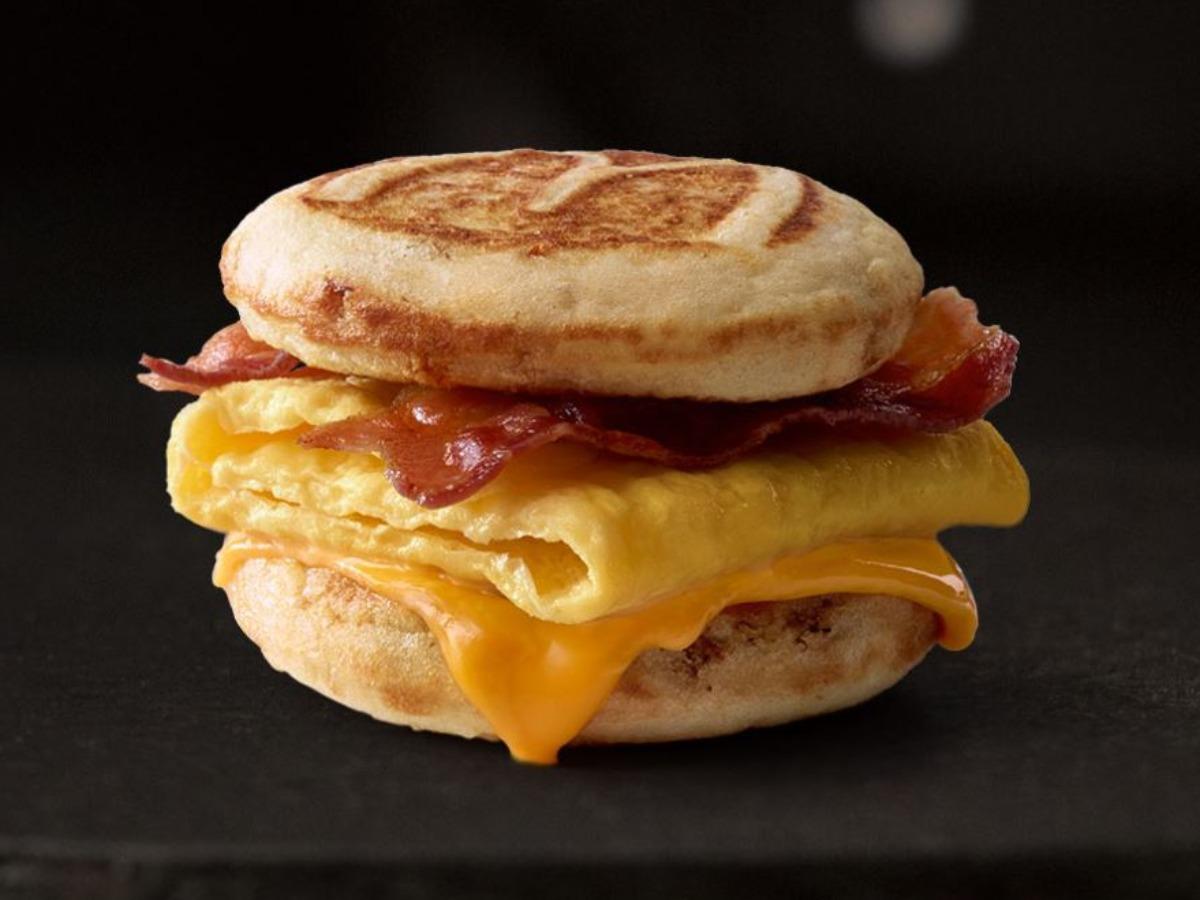
NUTRITIONAL PROFILE (PER SERVING):
CALORIES: 430
FAT: 21 g (Saturated Fat: 9 g)
SODIUM: 1230 mg
CARBOHYDRATES: 44 g (Dietary Fiber: 2 g, Sugars: 15 g)
PROTEIN: 17 g
This McGriddle variant features bacon instead of sausage, resulting in lower calorie, fat, and saturated fat content. However, it still delivers over 1,200 milligrams of sodium, which exceeds half of your daily requirement. While slightly lower in protein and providing 13 grams of added sugar, eliminating the bacon reduces the meal to 360 calories and 15 grams of fat, albeit at the expense of a few grams of protein. Exploring alternative sandwich options before opting for McGriddles is advisable.
10) Sausage McGriddle
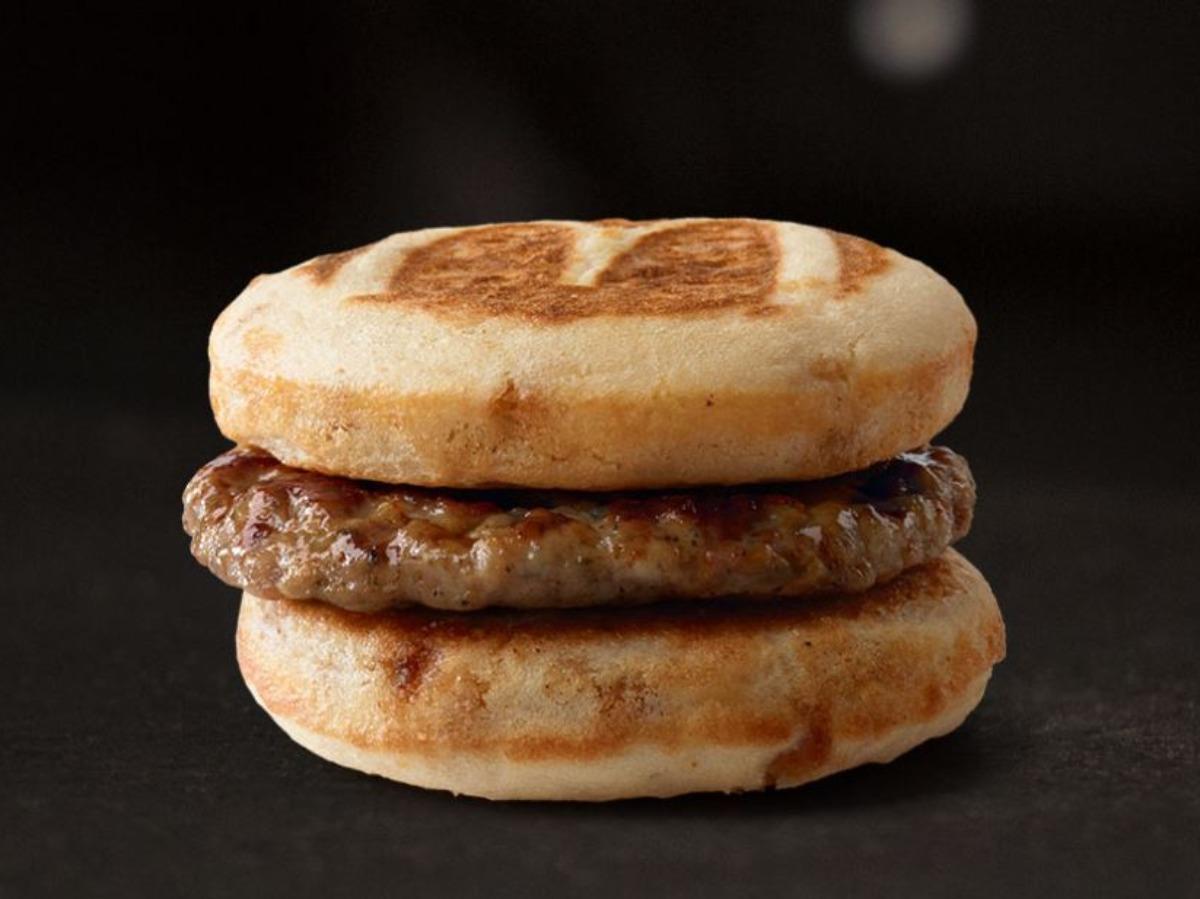
NUTRITIONAL INFORMATION (PER SERVING):
CALORIES: 430
FAT: 24 g (Saturated Fat: 9 g)
SODIUM: 990 mg
CARBOHYDRATES: 41 g (Dietary Fiber: 2 g, Sugars: 14 g)
PROTEIN: 11 g
Consisting of griddle cakes and a sausage patty, this choice offers only a marginal improvement over other McGriddles options on the menu. With 430 calories, it provides a reasonable amount for many adults, yet the nutrient composition falls short. A relatively low protein and fiber content makes this option less satiating, and despite sodium being under 1,000 milligrams, it still qualifies as a high amount for a single meal.
9) Sausage Biscuit with Egg
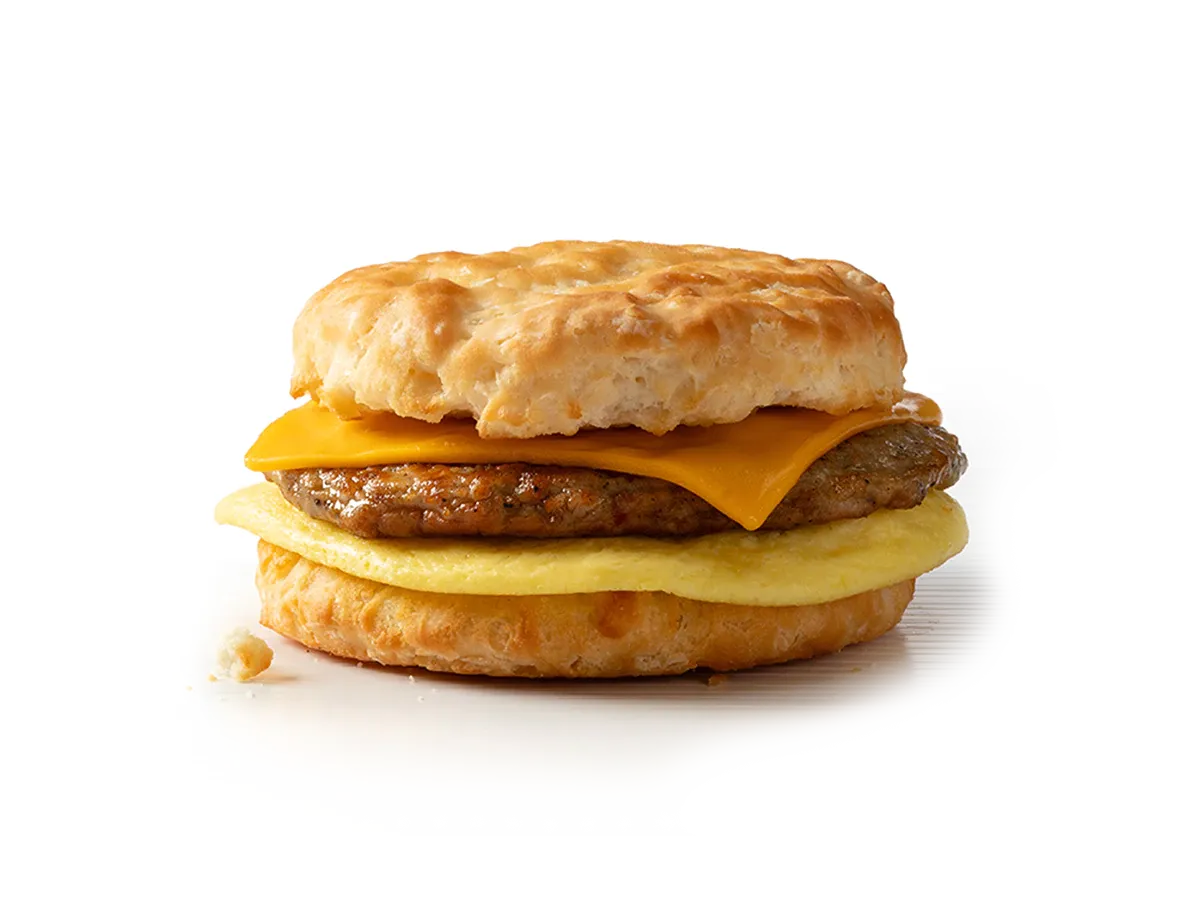
NUTRITIONAL PROFILE (PER SERVING):
CALORIES: 530
FAT: 35 g (Saturated Fat: 15 g)
SODIUM: 1190 mg
CARBOHYDRATES: 38 g (Dietary Fiber: 2 g, Sugars: 3 g)
PROTEIN: 17 g
Fortunately, this breakfast sandwich contains only 1 gram of added sugar, making it a healthier choice compared to the McGriddles. However, it still lacks fiber and contains high levels of sodium, fat, and saturated fat. To enhance this option, consider omitting the sausage and supplementing with a side of plain Greek yogurt from home for added protein without the excess fat and sodium.
8) Sausage Biscuit

NUTRITIONAL INFORMATION (PER SERVING):
CALORIES: 460
FAT: 30 g (Saturated Fat: 13 g)
SODIUM: 1090 mg
CARBOHYDRATES: 37 g (Dietary Fiber: 2 g, Sugars: 2 g)
PROTEIN: 11 g
While 460 calories may suit many adults for a meal, the deficiency in protein and fiber in this McDonald's breakfast menu item diminishes its appeal. Unfortunately, there aren't many adjustments that significantly enhance this meal. One potential modification involves omitting half of the biscuit and obtaining carbohydrates from a serving of fruit and plain Greek yogurt brought from home. This enhancement introduces fiber and protein without substantially increasing the calorie count.
7) Bacon, Egg & Cheese Biscuit
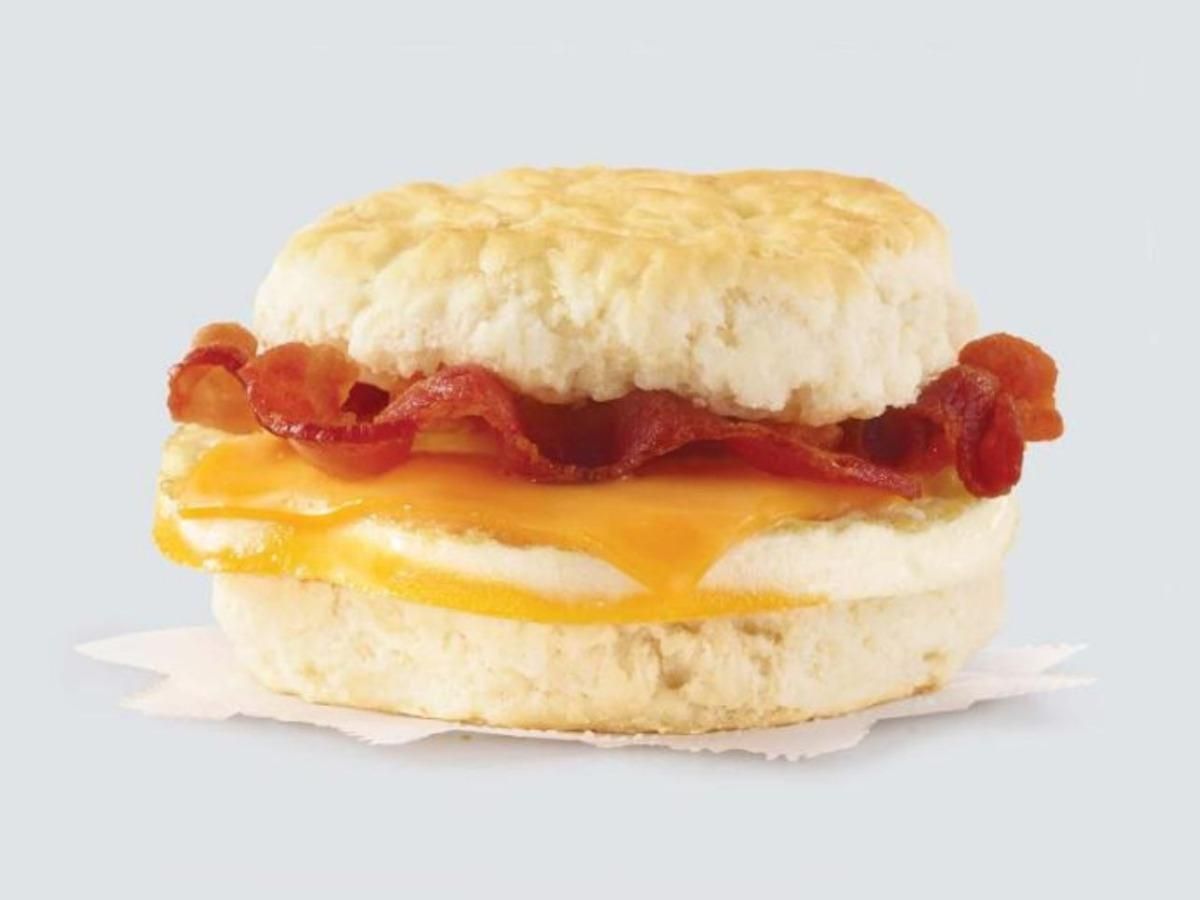
NUTRITIONAL PROFILE (PER SERVING):
CALORIES: 460
FAT: 26 g (Saturated Fat: 13 g)
SODIUM: 1330 mg
CARBOHYDRATES: 39 g (Dietary Fiber: 2 g, Sugars: 3 g)
PROTEIN: 17 g
While bacon is often perceived as a fatty choice, it typically contains fewer grams of fat and saturated fat compared to sausage. With fewer than 500 calories, this sandwich is reasonably balanced from an energy standpoint but falls short in terms of overall nutrition. To trim some fat from this meal, consider omitting the butter and incorporating some fruit from home to boost fiber content.
6) Hash Browns

NUTRITIONAL INFORMATION (PER SERVING):
CALORIES: 140
FAT: 8 g (Saturated Fat: 1 g)
SODIUM: 310 mg
CARBOHYDRATES: 18 g (Dietary Fiber: 2 g, Sugars: 0 g)
PROTEIN: 2 g
While hash browns may not constitute a complete meal by themselves, they can serve as a sensible accompaniment to a lean protein and some fruit. If you're hankering for potatoes at breakfast, opting for a side order of hash browns from McDonald's breakfast menu is a reasonable choice. With a few grams of fiber and no added sugar, they can complement a lean protein such as egg whites scrambled with veggies, alongside another source of fiber like fruit.
5) Sausage McMuffin

NUTRITIONAL PROFILE (PER SERVING):
CALORIES: 400
FAT: 26 g (Saturated Fat: 10 g)
SODIUM: 760 mg
CARBOHYDRATES: 29 g (Dietary Fiber: 2 g, Sugars: 2 g)
PROTEIN: 14 g
While 400 calories may suffice for a meal, this sandwich offers only 14 grams of protein, potentially resulting in a less satisfying meal, particularly when coupled with low fiber content. The relatively lower sodium content compared to other sandwiches is noteworthy; however, a few adjustments could enhance this option. Omitting the cheese and butter from the sandwich creates a 330-calorie sandwich, allowing room for the addition of lean protein and fruit from home for a more balanced meal.
4) Sausage McMuffin with Egg
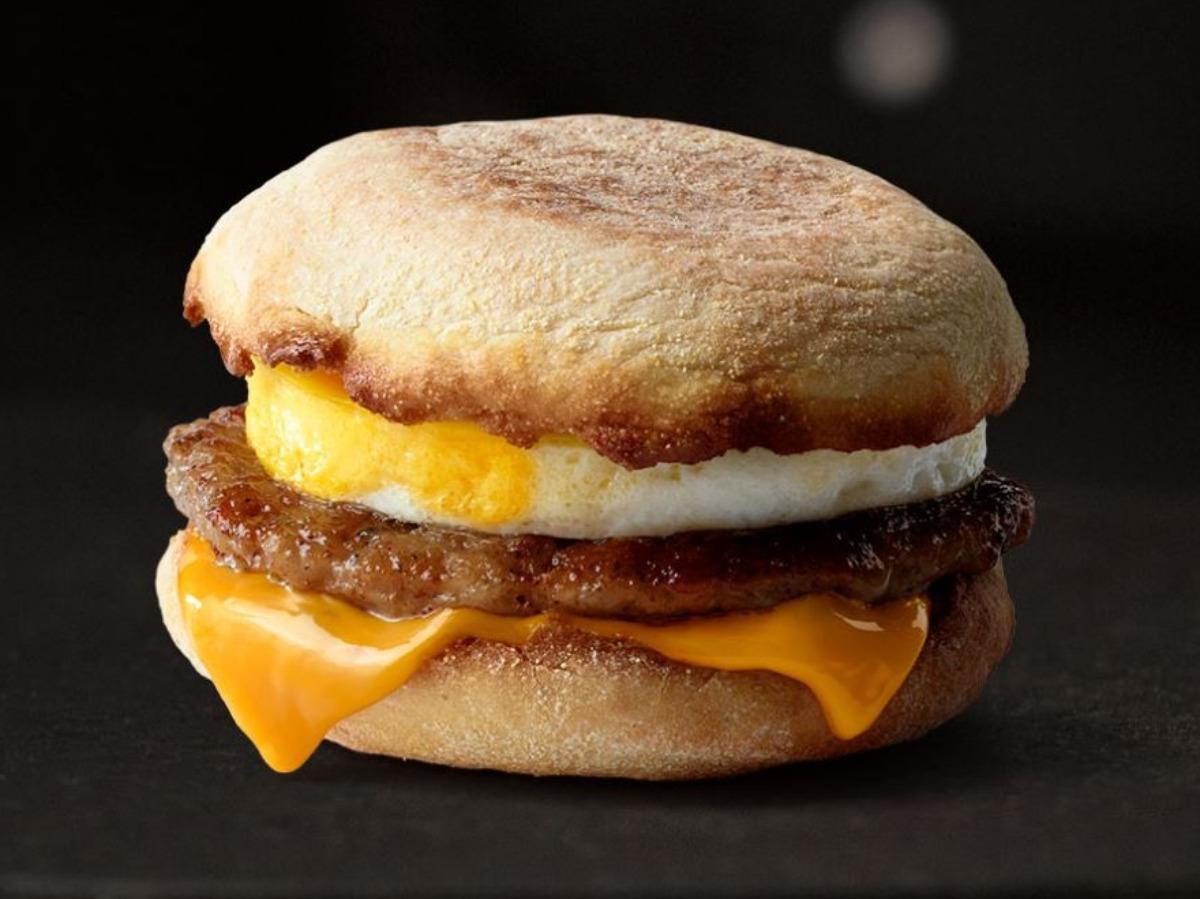
NUTRITIONAL INFORMATION (PER SERVING):
CALORIES: 480
FAT: 31 g (Saturated Fat: 12 g)
SODIUM: 830 mg
CARBOHYDRATES: 30 g (Dietary Fiber: 2 g, Sugars: 2 g)
PROTEIN: 20 g
Among all the breakfast sandwiches on the McDonald's menu, the McMuffins stand out as the best choice from a nutritional perspective. They offer fewer grams of saturated fat and lower sodium content, coupled with higher protein content. While the presence of sausage elevates the saturated fat content beyond the ideal range, it still remains a reasonable option. Omitting the cheese from this sandwich reduces saturated fat by 2 grams while maintaining protein at 18 grams, thus rendering it a slightly healthier alternative.
3) Fruit & Maple Oatmeal
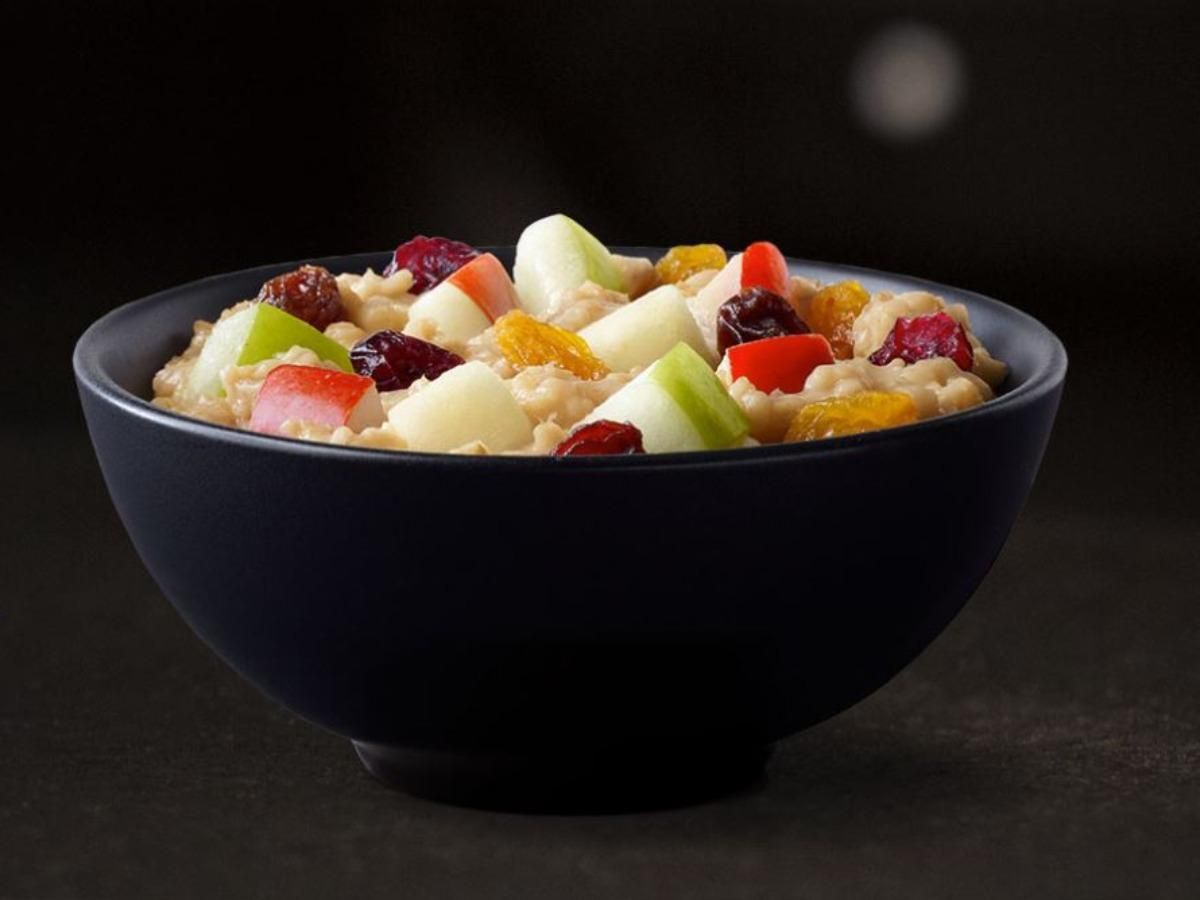
NUTRITIONAL PROFILE (PER SERVING):
CALORIES: 320
FAT: 4.5 g (Saturated Fat: 1.5 g)
SODIUM: 150 mg
CARBOHYDRATES: 64 g (Dietary Fiber: 4 g, Sugars: 31 g)
PROTEIN: 6 g
Oatmeal, renowned for its fiber content, is a commendable source of quality carbohydrates on its own. However, in this menu item, the oatmeal contains 18 grams of added sugar. While this is considerably less than many other items on McDonald's breakfast menu, it prevents this option from ranking higher on our list. Additionally, the oatmeal's low fat and protein content render it less balanced compared to other options. Omitting the cranberry and raisin blend reduces added sugar, and incorporating nuts from home provides an easy source of protein and fat to enhance this option.
2) Sausage Burrito
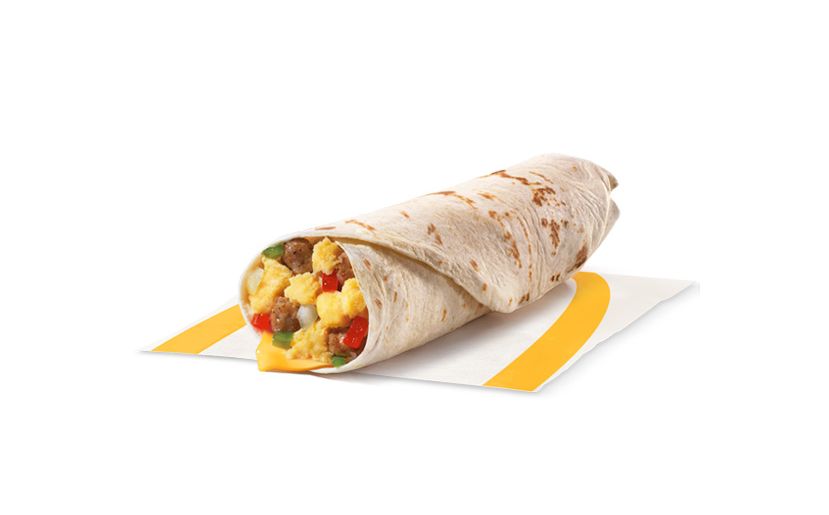
NUTRITIONAL PROFILE (PER SERVING):
CALORIES: 310
FAT: 17 g (Saturated Fat: 7 g)
SODIUM: 800 mg
CARBOHYDRATES: 25 g (Dietary Fiber: 1 g, Sugars: 2 g)
PROTEIN: 13 g
This individual breakfast burrito stands out as an excellent meal option. Its calorie content permits the addition of healthy sides from home to create a balanced meal, and its initial nutrient profile surpasses that of many other items on the menu. Incorporating a small portion of nuts will boost fiber and protein, while a serving of fruit adds fiber and other micronutrients, resulting in a well-rounded meal.
1) The Healthiest McDonald's Breakfast Is… the Egg McMuffin

NUTRITIONAL PROFILE (PER SERVING):
CALORIES: 310
FAT: 13 g (Saturated Fat: 6 g)
SODIUM: 770 mg
CARBOHYDRATES: 30 g (Dietary Fiber: 2 g, Sugars: 3 g)
PROTEIN: 17 g
The top choice on the McDonald's breakfast menu is undoubtedly the classic Egg McMuffin. Its reasonable calorie count, fat content, and saturated fat levels earn it the top spot on our list. Additionally, it satisfies protein requirements for many while containing only 1 gram of added sugar. The only downside is its lack of fiber, which can be remedied by incorporating fruit from home as a side to boost the meal's fiber content while keeping it under 400 calories.

